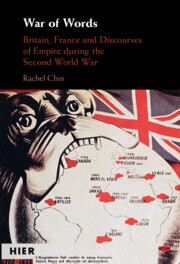Book contents
- War of Words
- War of Words
- Copyright page
- Dedication
- Contents
- Acknowledgements
- Abbreviations
- Introduction
- 1 From the Dunkirk Evacuations to the Franco-German Armistice
- 2 ‘The Real Question at Issue’
- 3 A Necessary Tragedy? The British Bombardments of the French Fleet at Mers El-Kébir
- 4 Vichy, the Free French and the Battle for Imperial Influence at Dakar in September 1940
- 5 Promises of Independence
- 6 Operation Torch
- 7 Independence on French Terms
- 8 Holding On to Empire
- Conclusion
- Bibliography
- Index
4 - Vichy, the Free French and the Battle for Imperial Influence at Dakar in September 1940
Published online by Cambridge University Press: 07 July 2022
- War of Words
- War of Words
- Copyright page
- Dedication
- Contents
- Acknowledgements
- Abbreviations
- Introduction
- 1 From the Dunkirk Evacuations to the Franco-German Armistice
- 2 ‘The Real Question at Issue’
- 3 A Necessary Tragedy? The British Bombardments of the French Fleet at Mers El-Kébir
- 4 Vichy, the Free French and the Battle for Imperial Influence at Dakar in September 1940
- 5 Promises of Independence
- 6 Operation Torch
- 7 Independence on French Terms
- 8 Holding On to Empire
- Conclusion
- Bibliography
- Index
Summary
The bombardments at Mers el-Kébir highlighted the tensions between Britain and metropolitan France. Two months later, Operation Menace aimed to bring Senegal into the Free French colonial sphere. Heavy resistance from forces loyal to Vichy derailed British-Gaullist plans. The operation was abandoned on 25 September 1940.
This chapter presents the complex triangular relationship between Britain, Vichy and the Free French. At the forefront was the contradiction between British desires to foster Anglophilia within metropolitan France and its willingness to intercede violently in Vichy colonial territory. Its solution was to frame the operations as entirely French, in both conception and leadership. Official descriptions and justifications of Operation Menace argued that the beleaguered population within Senegal demanded to be allied with the Free French movement.
The British-Free French failure to capture Dakar highlighted the relative weakness of de Gaulle’s movement. Public and media criticism in the British metropole and the United States favoured military victory over altruistic claims that the operation had been abandoned to ‘avoid a fight amongst Frenchmen.’ At the same time, the Dakar operations fostered tensions between British officials and de Gaulle, which contradicted public declarations of cooperation. These would become increasingly difficult to resolve in the following years.
- Type
- Chapter
- Information
- War of WordsBritain, France and Discourses of Empire during the Second World War, pp. 104 - 135Publisher: Cambridge University PressPrint publication year: 2022

